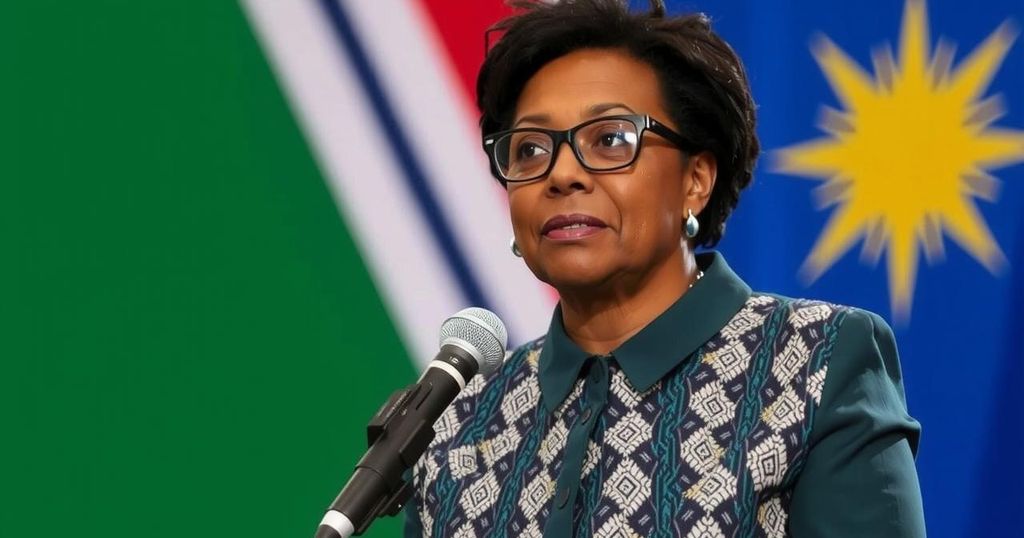Politics
AFRICA, DEMOCRACY, GOVERNANCE, GOVERNMENT, INDEPENDENCE MOVEMENT, INDEPENDENT, INDEPENDENT PATRIOTS FOR CHANGE, LEADERSHIP, NAMIBIA, NAN, NANDI - NDAITWAH, NET, NETUMBO NANDI - NDAITWAH, PANDULENI ITULA, PATRIOTS FOR CHANGE, SOCIAL WELFARE, SOUTH AFRICA, SWAPO, WINDHOEK
Leila Ramsay
0 Comments
Namibia’s Election: Female VP Leads Amid Technical Issues and Legal Challenges
Namibia’s presidential election sees Vice President Netumbo Nandi-Ndaitwah from the SWAPO party leading in early results. The election has faced severe criticism due to technical issues, prompting a three-day extension of voting. The opposition challenges the election’s legality, with intentions to pursue legal action. The outcome may signal significant political changes amidst rising discontent over economic conditions and governmental corruption.
Namibia’s presidential election is currently underway with early results indicating that Netumbo Nandi-Ndaitwah, the candidate from the ruling SWAPO party and the country’s first female Vice President, is in the lead. However, this election has been marred by significant technical problems, including a lack of ballot papers, which necessitated an extension of the voting period by three days. The opposition has expressed strong dissatisfaction with the election process, labeling the extension as illegal and compromising the election’s credibility.
As the counting progresses, Nandi-Ndaitwah has garnered approximately 56% of the recorded votes thus far, with her nearest rival, Panduleni Itula from the Independent Patriots for Change, securing around 27%. The final results are anticipated later in the week, but opposition parties are already hinting at a legal challenge to contest the election’s validity, citing concerns over the democratic integrity of the process.
Since its independence from South Africa’s apartheid regime in 1990, Namibia has enjoyed a reputation for relative political stability. Nonetheless, SWAPO’s grip on power is increasingly questioned amid rising youth discontent stemming from high unemployment rates and instances of governmental corruption.
The situation mirrors trends seen across southern Africa where several ruling parties are facing significant public dissent and electoral challenges. In light of these developments, the Electoral Commission has refused calls for a rerun of the election, further complicating an already tense political climate.
Political analysts view this election as critical for the future of Namibia. Nandi-Ndaitwah’s potential presidency could mark a pivotal change in the region’s political landscape, yet the unresolved issues surrounding the election process raise fears regarding the consolidation of democracy in the country.
As opposition leader McHenry Venaani articulated, “It is about our country, it’s about our democratic credentials, it’s about the country that must work for everybody, the poor and the rich. It cannot only work for those who want to remain in power by hook or crook.” This sentiment encapsulates the broader frustrations present among Namibians today.
In conclusion, Namibia’s latest election highlights not only the challenges faced by ruling parties in maintaining public trust but also the critical questions regarding the future of governance in the nation. With legal challenges looming and societal tensions simmering, the electoral landscape may be poised for significant transformation.
Namibia has been a relatively stable democracy since gaining independence in 1990, governed by the SWAPO party, which was integral to the nation’s struggle against apartheid. Despite this legacy, ongoing economic difficulties, including high unemployment rates and corruption scandals, have generated discontent among citizens, particularly the youth. This election is pivotal, not only due to the potential election of its first female president but also given the wider implications for governance in Namibia and the southern African region. The complaints from the opposition about the election process reflect broader regional trends where ruling parties have been challenged by rising public dissatisfaction and demands for accountability.
The current election in Namibia presents critical insights into the state of its democracy, with the potential for historic leadership and significant challenges posed by technical issues and opposition complaints. As the situation unfolds, the actions taken by both the Electoral Commission and the opposition will shape the political climate in Namibia and could influence the future of governance in the region at large.
Original Source: abcnews.go.com




Post Comment